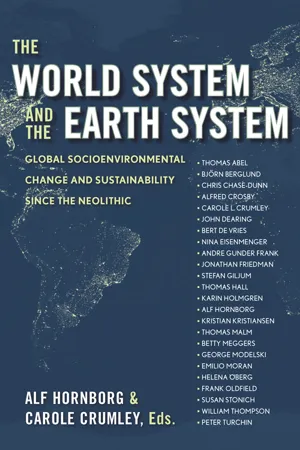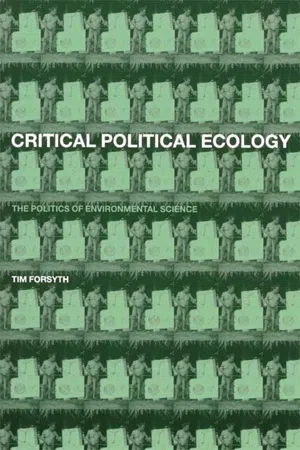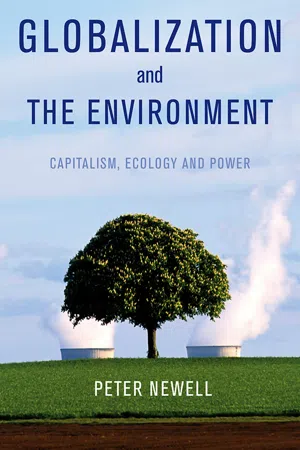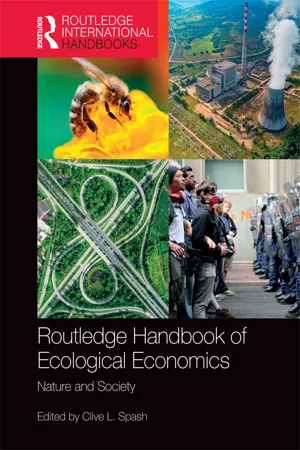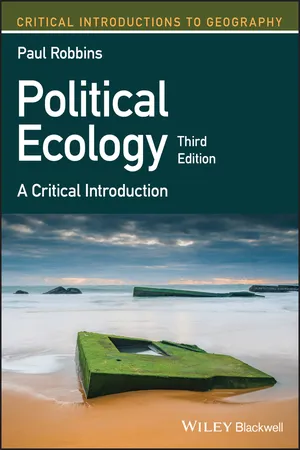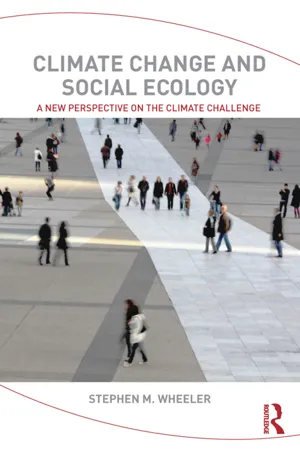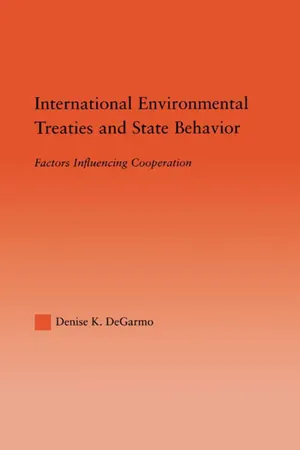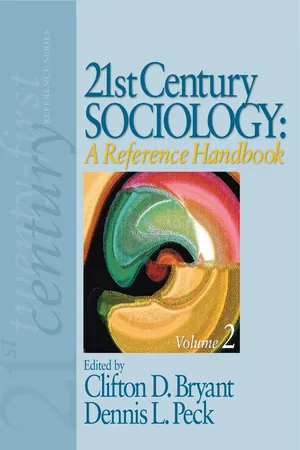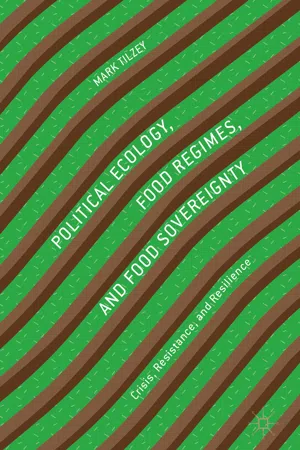Politics & International Relations
Social Ecology
Social ecology is a theoretical framework that examines the relationship between human societies and the natural environment. It emphasizes the importance of social structures, political systems, and economic arrangements in shaping environmental issues. Social ecologists advocate for decentralized, community-based solutions to environmental problems, and promote the idea of creating sustainable and harmonious relationships between humans and nature.
Written by Perlego with AI-assistance
Related key terms
9 Key excerpts on "Social Ecology"
- eBook - ePub
The World System and the Earth System
Global Socioenvironmental Change and Sustainability Since the Neolithic
- Alf Hornborg, Carole L Crumley, Alf Hornborg, Carole L Crumley(Authors)
- 2016(Publication Date)
- Routledge(Publisher)
Stonich 2001 ).Political Ecology: Unresolved Issues and Debates
Although political ecology has boomed, several continuing concerns remain unresolved that may affect the potential contributions of the field, including more collaboration with sustainability scientists. Among the most important of these issues is that political ecology has become so diverse in terms of theoretical perspectives, concepts, and methodologies that it lacks unity as a coherent field of study (Stonich 2001 ). While political ecology may represent an emerging research agenda, neither past developments nor recent trends are theoretically integrated, and it remains to be seen where existing convergences and tensions may lead. Current trends and new directions in political–ecological research reveal significant tensions between material and idealist perspectives that are linked to possibly irreconcilable differences between scientific and poststructural/postmodern positions. Another of the most persistent and serious debates revolves around whether or not political ecology has become “environmental politics” rather than “ecology,” that is, the familiar question, “Where is the Ecology?” It is ironic that a field that developed in part as a critique of “ecology without politics” has now been accused of becoming “politics without ecology.” Prompted by the critique, “Against Political Ecology,” published by Vayda and Walters, mentioned above, this debate remains the most serious point of contention for both proponents and opponents of political ecology (see Paulson, Gezon, & Watts 2003 and Walker 2005 for recent and contrasting perspectives on this issue). In our opinion, the unfortunate belief by proponents of sustainability science that all political ecology has become “politics without ecology” is the most serious obstacle to the integration of political ecology and sustainability science. Finally, a serious criticism often made by more “scientifically” oriented researchers is that, because most political–ecological studies have tended to focus on understanding social and environmental changes within the context of local ecologies and histories, studies remain restricted in their applicability and unable to contribute to the creation of broader theories. While this is a serious concern, one of the major thrusts of recent political–ecological studies is aimed precisely at the rigorous methodological integration of local-level studies within broader contexts and various scales (Neumann 2005 - eBook - ePub
Critical Political Ecology
The Politics of Environmental Science
- Timothy Forsyth(Author)
- 2004(Publication Date)
- Routledge(Publisher)
Yet, although this original book did not discuss environmental conservation, later volumes on environment have adopted a similar usage of the term, political ecology. Anderson, for example, wrote:Just as environmental ecology refers to interaction and interdependence among soil, air and water, the peasants’ political ecology also refers to the interactive interdependence among spheres – the individual, the community, the natural world, and the national society.(Anderson, 1994: 6)Fourth, political ecology has been defined as a more specific analysis of Marxist debates about materialism, justice, and nature in capitalist societies, with the view to achieving a fairer distribution of rights and resources:Political ecology, like the Marxist-inspired workers’ movement, is based on a critique – and thus an analysis, a theorized understanding – of the “order of existing things.” More specifically, Marx and the greens focus on a very precise sector of the real world: the humanity–nature relationship, and, even more precisely, relations among people that pertain to nature (or what Marxists call the “productive forces”).(Lipietz, 2000: 70)Finally, there is the use of “political ecology” to refer in general terms to the politics of environmental problems without specific discussion of “ecology.” Bryant (1992: 13), for example, describes political ecology as an inquiry into “the political forces, conditions and ramifications of environmental change,” and may include studies of environmental impacts from different sources; location-specific aspects of ecological change; and the effects of environmental change on socio-economic and political relationships (see also Lowe and Rüdig, 1986). In a later publication, Bryant and Bailey (1997: 190) suggest that “political ecology” as a debate focuses on interactions between the state, non-state actors, and the physical environment, whereas “environmental politics” as a debate concerns the role of the state generally.This book differs from these approaches by seeking to establish the political forces behind different accounts of “ecology” as a representation of biophysical reality. In this sense, a “critical” political ecology may be seen to be the politics of ecology as a scientific legitimatization of environmental policy. The approach adopted in this book may be seen to differ with the historic approaches to political ecology listed above because these approaches either adopt a priori concepts of environmental science and explanation; or take insufficient steps to avoid the separation of environmental explanation and politics in the analysis of environmental politics. The following discussions describe some themes of these past approaches, and how this book may argue for different approaches. The section after this then discusses how science and politics may be integrated. - eBook - ePub
Globalization and the Environment
Capitalism, Ecology and Power
- Pete Newell(Author)
- 2013(Publication Date)
- Polity(Publisher)
So far the story of globalization and its relationship to environmental governance could be told through critical International Political Economy (IPE) accounts drawing on historical materialist analysis of (global) environmental politics (Gale and M’Gonigle 2000; Levy and Newell 2005) and broader bodies of critical scholarship on globalization and capitalism which usefully draw attention to the social forces underpinning the project of globalization, understood as the deepening, intensification and re-scaling of capitalism (Gill 2002; Sklair 2002b; Robinson 2004). What is missing from such an account, however, is more detailed evidence of the social and environmental consequences of a global economy organized in this way and premised upon these relations of power. This is where I argue that work on political ecology can make a useful contribution, balancing the macro-focus of critical IPE and grounding our analysis of the ‘socio-natures’ (Castree and Braun 2001) that produce and are produced by globalization.Which Political Ecology?
What is political ecology and how does it help us to understand the relationship between globalization and the environment? At its broadest, political ecology seeks to provide a framework for understanding human-society or ‘socio-natural’ relations (Robbins 2004). More specifically, it examines the interrelations of politics and power, structures and discourses with the environment (see table 2.2). Here I highlight those elements which offer a bridge to critical traditions within IPE and Global Environmental Politics discussed above (and in further depth in chapter 3) (Paterson 2001b; Saurin 2001; Newell 2008c): materialist political ecologies that posit linkages between economies and the ecologies of which they are a part. For example, the global political ecology that Peet, Robbins and Watts engage in ‘emphasises global political economy as a main causal theme’ (Peet et al. 2011: 23). For them:Political ecology is predicated on an ecologically conceptualised view of politics: it is attentive to the hard edges of capitalist accumulation and global flows of labour, capital and information, but also attuned to the complex operations of power-knowledge . . . all within a system prone to political-economic crisis (Peet et al. 2011: 23).It is a research agenda that coalesces around the impact of capitalist development on the environment, as well as its emergence through particular socio-natures. It centres both on the social and political implications of prevailing practices of environmental protection and management, and the political economy of the way ‘new natures’ are produced. Such lines of enquiry have been pursued through work on the practices of commodification of ‘neo-liberal natures’ (Castree 2003, 2008; Budds 2004; Mansfield 2004, 2007; Bakker 2005), as well as through ‘classic’ political ecology concerns with questions of access to material and natural resources, and issues of resistance, equity and justice in the negotiation and distribution of social and environmental benefits at multiple scales (Peluso 1992; Bryant and Bailey 1997; Paulson et al. 2003; Zimmerer and Bassett 2003). - eBook - ePub
Routledge Handbook of Ecological Economics
Nature and Society
- Clive L. Spash, Clive L. Spash(Authors)
- 2017(Publication Date)
- Routledge(Publisher)
1 SOCIAL ECOLOGICAL ECONOMICSClive L. SpashIntroduction
Social ecological economists have been present since the creation of the International Society for Ecological Economics (ISEE) and provide the main approach in the European Society for Ecological Economics (ESEE) (Røpke, 2005; Spash, 1999). They recognise the importance of political economy, Social Ecology and the role of institutions for understanding the economic system and its interactions with Nature. They practice serious interdisciplinary knowledge integration across social and natural sciences (Spash, 2012a). They realise the need for a radical social ecological transformation based on their (natural and social) scientific knowledge. Social ecological economics is for many the core understanding of ecological economics (Spash, 2013; Spash and Ryan, 2012).Ecological economics was founded upon the importance of placing the economy within its biophysical limits, while recognising the need for the conduct of human society to respect others both present and future, human and non-human. Key concerns included the failures of economic policy to address environmental impacts and the existing economic structure and its institutions to meet minimal standards of ethical conduct. However, different forces have shaped how the field of knowledge has combined topics and addressed (or not) these various issues. In particular, the gradual but persistent neoliberalisation of society since the 1980s has pushed an ecologically informed environmental policy discourse into the language of economics and finance (Spash and Aslaksen, 2015). The result has been a mainstreaming of environmentalism in general and ecological economics in particular (Spash, 2013). Economics has become identified with what Polanyi (1957) termed ‘formal economics’, where a narrow market exchange model dominates, a model that misconstrues the historical meaning of markets, trade and money, and so is blind to the potential alternative forms of social integration and organisation. Many have lost their way due to the supposed necessity of being pragmatic in terms of adopting formal economic concepts, converting Nature into capital, ecosystem functions into goods and services, and pollution into a traded commodity. Explicit ethical judgement is replaced by the dogma of saving money to meet an ill-defined goal of economic efficiency, as if this had no ethical implications. - eBook - ePub
Political Ecology
A Critical Introduction
- Paul Robbins(Author)
- 2019(Publication Date)
- Wiley-Blackwell(Publisher)
Where people come to espouse forest protection as a goal after generations of destructive behavior, analysts were pointed towards examining changing arrangements of micro‐power in local institutions, rather than elusive environmental education (Agrawal 2005). Added to these more traditional threads, a new suite of concerns and questions began to follow. Where local people begin to syphon, channel, and divert precious water resources from an increasingly centralized grid – in places as far flung as Fayoum Egypt (Barnes 2014) and Tijuana Mexico (Meehan 2013) – what new hydro‐social and hydro‐political arrangements emerge? Where giant oil pipelines come to crisscross South America (Barry 2013) and Central Asia (Hindery 2013), what impacts do these formidable objects have on the political dynamics of states, towns, and indigenous communities? As climate change begins to unleash catastrophic urban heat waves in cities with little precedent, like Paris (Keller 2015) or Chicago (Klinenberg 2002), what makes the death rates so incredibly uneven between differing communities, divided by both race and class? What systems propel the social, environmental and ethical tragedies of the meat economy (Emel and Neo 2015)? Clearly, the breadth of concepts and concerns embraced in political ecology has become vast. Political Ecology is not a Theory or a Method This enormous empirical and theoretical heterogeneity challenges the unity of the enterprise as a whole. Indeed, some of the progenitors of the field have gone as far as to suggest that political ecology is effectively incoherent, a mere “cover for anarchic development” (Bryant 1999, p. 148). Senior practitioners have opined that the field has become so far‐reaching and inclusive that “it seems easier to say what [political ecology] is, than what it is not” (Blaikie 2008, p. 766) - eBook - ePub
Climate Change and Social Ecology
A New Perspective on the Climate Challenge
- Stephen M. Wheeler(Author)
- 2012(Publication Date)
- Routledge(Publisher)
39 Urban Ecology organized the First International Conference on Ecological cities in 1990, promoting a holistic advocacy agenda that included creek restoration, alternative energy, affordable housing, and regional planning. The Worldwatch Institute published literally hundreds of Worldwatch Papers on strategies for sustainability in different fields. These agendas, like others going back to Howard, Geddes, and Mumford, sought to synthesize new approaches to planning topics such as land use, transportation, housing, urban design, and economic development into a holistic, long-range vision of a sustainable society. To some extent other recent urban planning movements, such as the New Urbanism and Smart Growth, have done the same, although the results are often seen as just a slightly greener version of conventional urban and suburban development.Political ecology, a field that arose primarily in the 1980s and 1990s, investigates how political and social forces intersect with environmental concerns, often within rural contexts in developing countries. With roots in Marxism, cultural ecology, and political economy, this perspective emphasizes social justice issues and imbalances of power. Although it focuses heavily on critique of existing situations, political ecology provides an excellent foundation for developing more sustainable alternatives to current social ecologies, due to its important critique of power relations.40Developments in the natural sciences throughout the twentieth century also reinforced the ecological view of reality. Physics, for example, developed new views of the universe as a dynamic environment of radical contingency.41 Werner Heisenberg’s 1927 uncertainty principle (the discovery that both the location and the movement of atomic particles can never be known with certainty) and Einstein’s theories emphasizing the relativity of matter and energy helped set the tone. It was no longer possible to see the universe as operating according to Newtonian clockwork; the fundamental constituents of reality were much more tightly interwoven and unpredictable. Ilya Prigogine won a Nobel Prize in 1977 for the thermodynamic concept of self-organization – that is, a view of reality as including thermodynamically open systems forming complex, chaotic structures.42 Great interest arose in self-organizing systems in physics and chemistry as well as biology and sociology. Physicist David Bohm went so far as to develop a theory that human thought, society, and the universe were all composed of self-organizing interacting systems operating on holographic principles.43 - Denise DeGarmo(Author)
- 2013(Publication Date)
- Routledge(Publisher)
83 is one way in which international relations and the international environment may be more easily studied.According to this view, international politics is understood as a “socially constructed institution that varies across space and time, with multiple meanings and practices that are not set in stone.”84 Environmental problems are believed to be influenced by not only the technological instruments through which information is produced and disseminated, but also by the institutional venue in which problems and solutions are debated and decided.85 In other words, different people and groups construct their understanding of the global environment and the implications of environmental changes and processes in different ways. This in turn leads to different assumptions and perceptions of environmental needs and different understandings of global ecological interdependence.86 These competing processes of construction are mediated by a host of social, political and economic institutions.Three models for the resolution of international environmental problems emerge from the social construction framework. The first model, known as global managerialism, proposes that international environmental solutions not only require strong central protection of environments around the world, but the division of labor between governments and international organizations, with NGOs performing an advisory role on the side. International environmental protection, then, would be best achieved through world conservation and global environmental services. The second model, known as redistributive development, pays greater attention toward equity issues. According to this model, past global inequities and the future of environmentally sound development in the developing world requires the “North” to increase financial and technological assistance to the “South.” Finally, the international sustainability model promotes the adoption of global sustainable development practices in the environmental, economic, and social realms to ensure the preservation of the international environment and the continuation of environmentally sound development into the future.87- eBook - ePub
- Clifton D. Bryant, Dennis L. Peck(Authors)
- 2006(Publication Date)
- SAGE Publications, Inc(Publisher)
45HUMAN ECOLOGY
STEPHEN J. APPOLDNational University of SingaporeA BRIEF OUTLINE OF THE EARLY DEVELOPMENT OF HUMAN ECOLOGICAL THEORYE cologyis defined as “the science of the economy of animals and plants; that branch of biology which deals with the relations of living organisms to their surroundings, their habits and modes of life, etc.” (Oxford English Dictionary 2000). The first half of that definition implies an impulse toward efficient interdependence. Applied to humans, the second half of that definition implies much more than what is usually meant by the term human ecology , however. A consideration of the relations of individuals to their surroundings, their habits, and modes of life would include almost all aspects of what are now seen as “contextual effects.” It would include some aspects of developmental psychology (e.g., Barker and Wright 1954) and much of environmental psychology (Bechtel 1997). These are part of what is sometimes called autoecology (treating organisms individually as opposed to synecology , the study of collectivities), a field of inquiry that is perhaps part of ecology but not what is usually included under the term. That definition would also include studies, such as Gerth and Mills’s (1953) Social Structure and Character , among many others, that examine how a changing social structure affects the mode of life of a particular population. In contrast, sociological human ecology has been most concerned with investigating what are now termed aggregation effects , that is, how people, living together, create social organization. A reciprocal relationship between an individual or collectivity and its environment is posited. Human ecology is, therefore, concerned with the nature and process of community development (Hawley 1950).The term ecology was coined by the German botanist Ernst Haeckel in 1868, reviving much older concerns. The term human ecology may have been first used by J. Paul Goode, a University of Chicago geographer, at the 1907 meeting of the Association of American Geographers in describing an introductory university course. By 1920, Barrington Moore (1920), president of the Ecological Society of America, characterized geography as “human ecology” in his presidential address, and the journal Ecology reviewed Ellsworth Huntington and Sumner W. Cushing’s Principles of Human Geography under the title “Human Ecology” the following year. In 1922, Harlan Barrows, concerned about the continuing relevance of the field as the era of discovery neared its end, accepted the attribution as the new and future identity for geography in his presidential address to the Association of American Geographers. Anthropologists showed an interest in the relation of their field to ecology as early as 1903, but the term human ecology - eBook - ePub
Political Ecology, Food Regimes, and Food Sovereignty
Crisis, Resistance, and Resilience
- Mark Tilzey(Author)
- 2017(Publication Date)
- Palgrave Macmillan(Publisher)
It thereby retains the historical specificity of social systems whilst recognizing, simultaneously, their inescapable biophysical constitution and dependencies. In other words, we have in this corpus of work the basis of a theory of socio-natural dialectics that throws light on social system dynamics across both its historical and ecological dimensions. This work complements those undertaken over a similar period by self-styled ‘political ecologists’ (see, e.g., Peet and Watts 1996 ; Bryant and Bailey 1998 ; Robbins 2012 ; Peet et al. 2011 ; Perreault et al. 2015), with their focus perhaps not so much on the development of a general ontology of socio-nature, as upon the relationships between politico-economic structures and a range ‘environmental’ issues and changes in specific spatio-temporal contexts—that is, the way in which particular political economies have impacts upon their ‘environments’. The chapter attempts to build on these foundations by combining the above approaches and by giving particular attention to the further development of an ontology of political ecology which, while of relevance to all socio-natural systems, is deployed here with the specific purpose of theorizing the relationship between capitalism and agriculture, and in later chapters, the (re)current and inter-linked crises of food, the environment/energy, and finance. In so doing, this chapter draws upon, and attempts further to refine, in particular, the path-breaking scholarship of Burkett and Foster in relation to Marx and ecology, and of O’Connor (1991, 1998) in his conceptualization of the ‘two contradictions’ of capital
Index pages curate the most relevant extracts from our library of academic textbooks. They’ve been created using an in-house natural language model (NLM), each adding context and meaning to key research topics.
